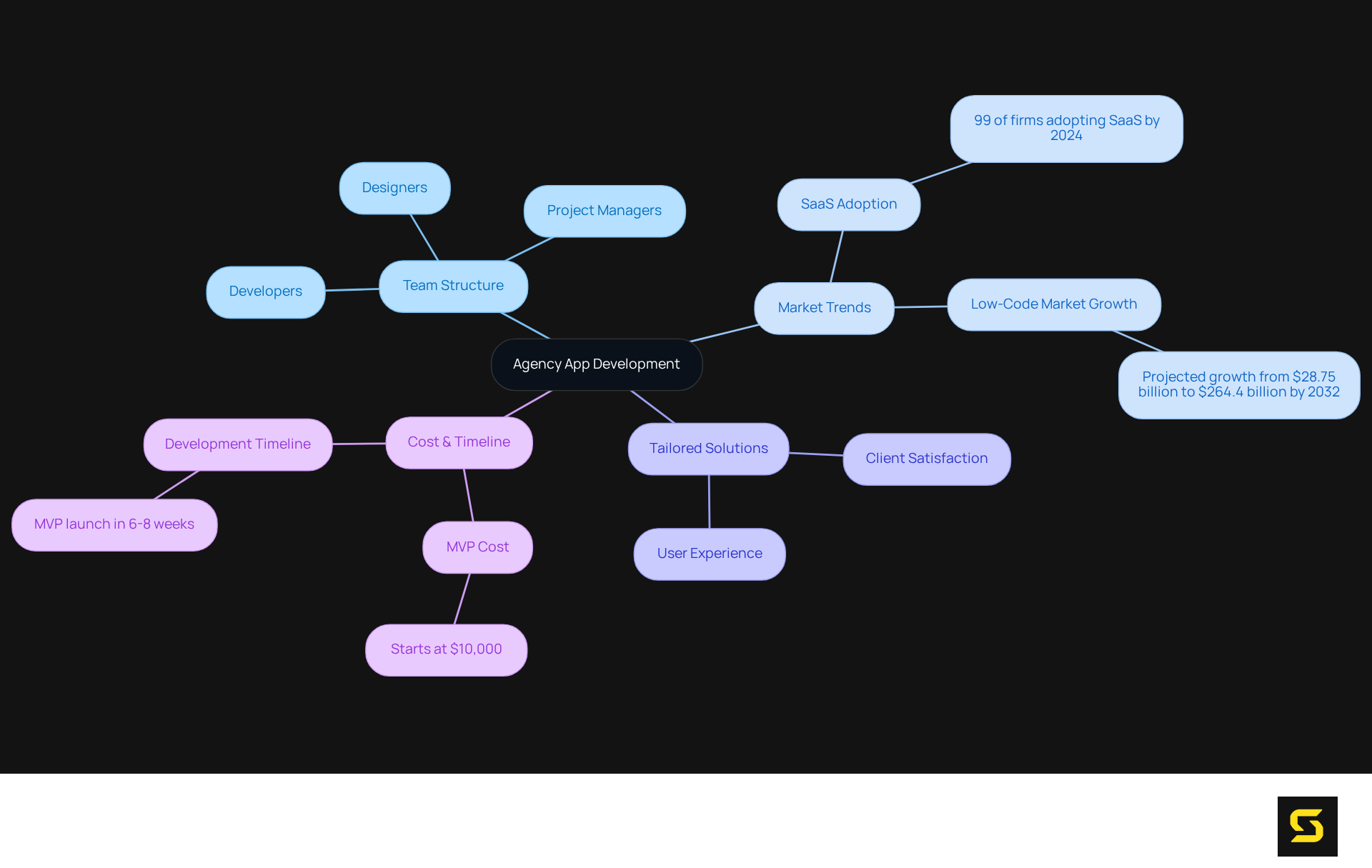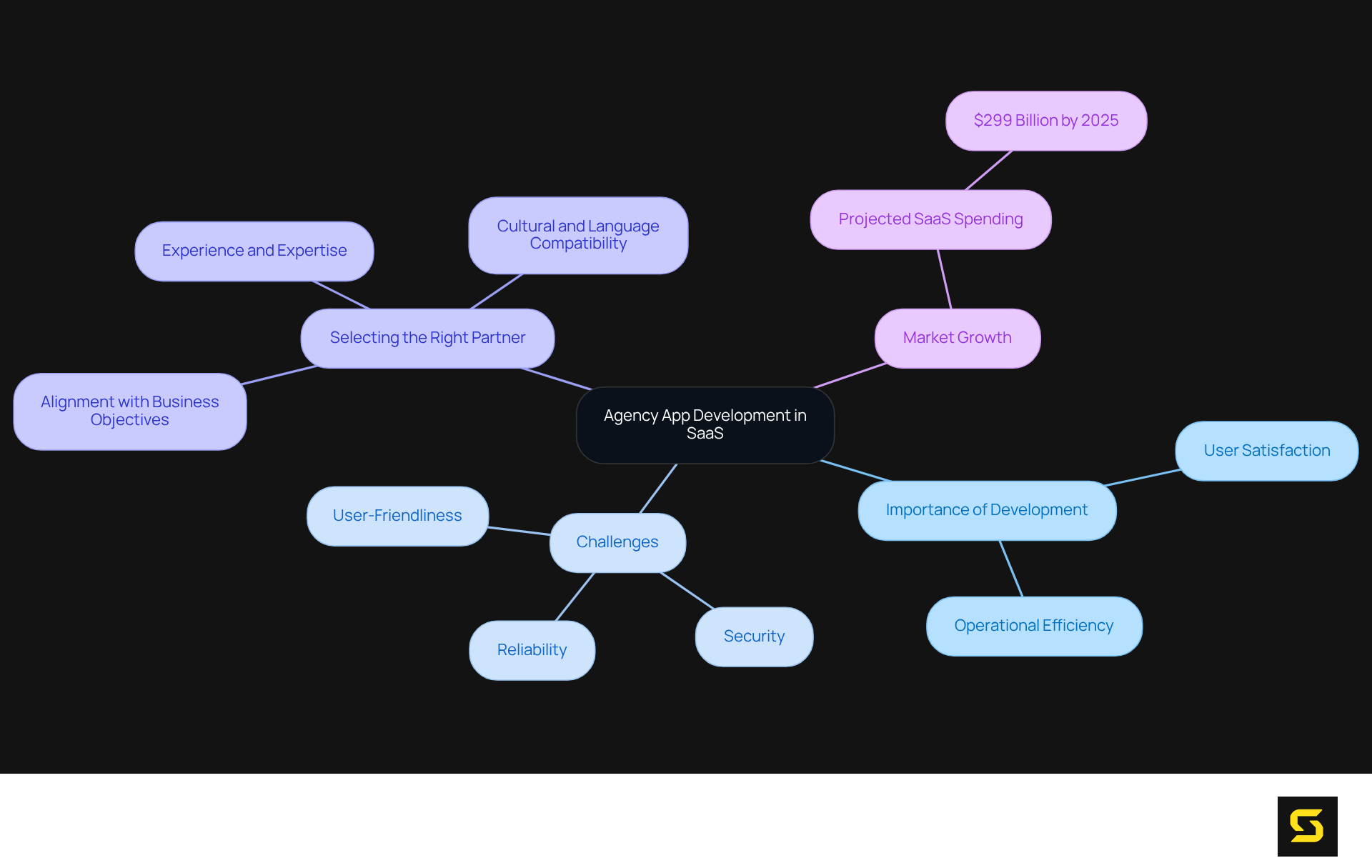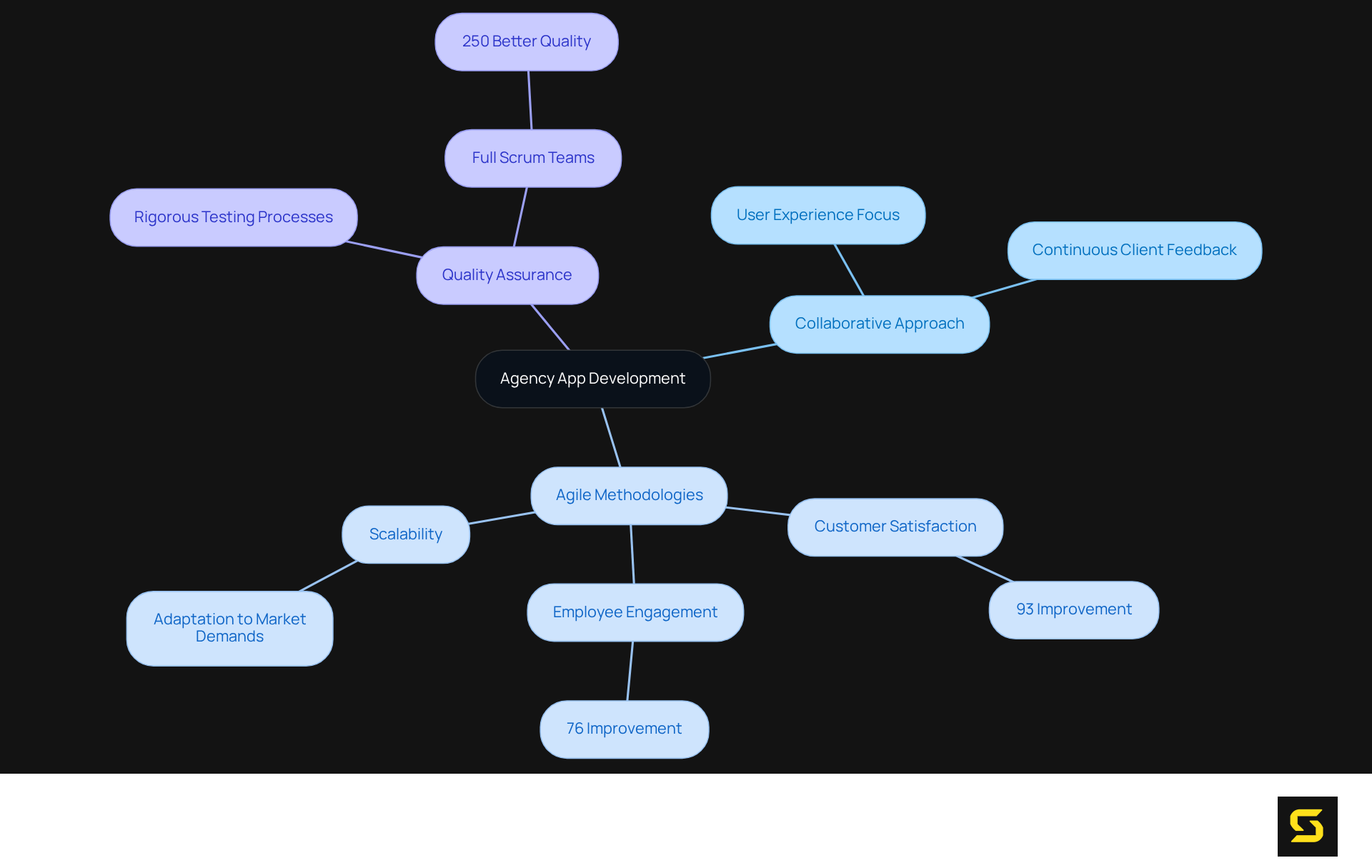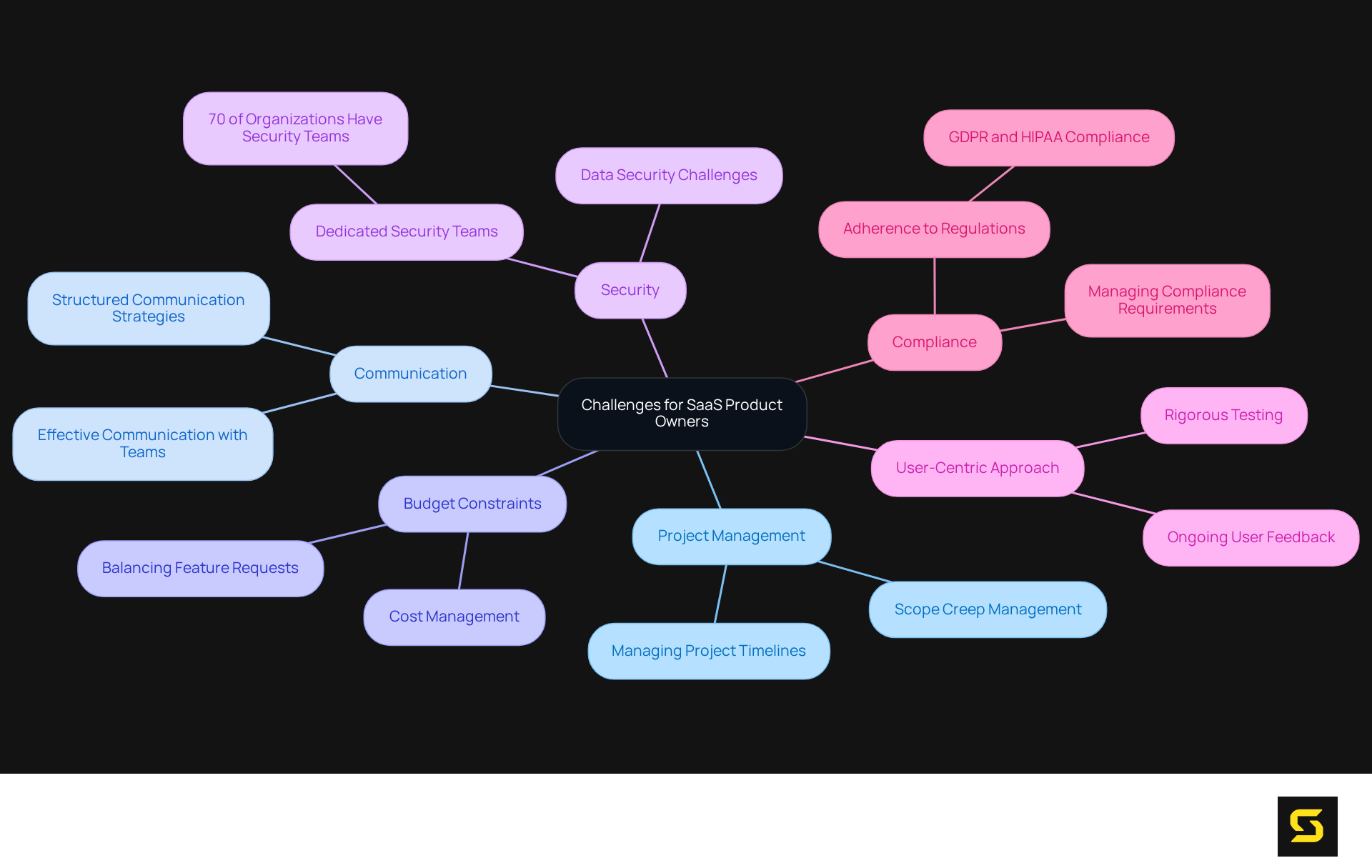Overview
Agency app development in the SaaS landscape is paramount for delivering customized software solutions that effectively address specific business needs. By leveraging cloud technology, organizations can achieve scalability and ease of access. Successful projects are grounded in tailored approaches, agile methodologies, and effective partnerships. These elements collectively enhance user satisfaction and ensure that the software remains reliable and secure, even amidst evolving market demands.
It is essential to recognize that the right strategies not only meet current requirements but also anticipate future challenges in a dynamic environment.
Introduction
In an increasingly digital world, the demand for customized software solutions is surging, particularly within the Software as a Service (SaaS) landscape. Agency app development has emerged as a vital strategy for businesses seeking to harness expert skills without the burden of in-house resources.
However, as organizations navigate this complex terrain, they face significant challenges in ensuring their applications are not only functional but also secure and user-friendly.
What are the key elements that define successful agency app development?
How can businesses effectively partner with development agencies to thrive in this competitive environment?
These questions are crucial for any organization aiming to leverage technology for growth.
Define Agency App Development
Agency software creation is a critical process undertaken by specialized firms dedicated to delivering customized solutions for their clients. These organizations typically employ a team of developers, designers, and project managers who collaborate to produce software that meets specific business requirements. Within the realm of Software as a Service (SaaS), agency software creation involves developing tools hosted in the cloud and accessible via the internet, promoting scalability and user-friendliness. This model empowers companies to leverage the expertise of creation firms to develop high-quality applications without the need for internal resources.
The app creation sector is experiencing significant growth, with projections indicating that 99% of firms will adopt at least one software-as-a-service solution by the end of 2024. This trend highlights the increasing dependence on to address diverse business needs. Furthermore, the global low-code creation market is expected to surge from $28.75 billion in 2024 to $264.4 billion by 2032, signaling a shift towards more accessible and efficient creation processes.
Successful agency app development projects in the SaaS sector highlight the significance of tailored solutions. As industry experts emphasize, the ability to customize software to meet specific client needs is crucial for achieving long-term success. Agencies that focus on user experience and seamless integration with existing systems are better equipped to deliver impactful results, ultimately enhancing client satisfaction and retention.
Moreover, the cost to develop a Minimum Viable Product (MVP) for a software service typically starts at USD 10,000, while a comprehensive product can range from USD 45,000 to 150,000. The timeline for launching an MVP generally spans 6 to 8 weeks, providing a realistic expectation for project completion.

Contextualize Agency App Development in SaaS
In the evolving software-as-a-service landscape, the creation of organization apps is crucial for empowering businesses to swiftly launch software accessible from anywhere. Subscription-based software solutions notably lower initial costs, allowing businesses to allocate resources towards continuous updates and support.
Nevertheless, organizations dedicated to SaaS development face unique challenges, including the necessity to ensure that software remains reliable, secure, and user-friendly, all while adapting to rapidly changing market demands. This scenario underscores the critical importance of ; the choice of a development partner can profoundly influence the application's success.
A meticulously chosen organization not only aligns with business objectives but also elevates user satisfaction, ultimately fostering operational efficiency and growth. Moreover, with SaaS spending projected to reach $299 billion by 2025, the significance of effective partnerships becomes even more pronounced for businesses striving to thrive in this competitive arena.

Explore Key Characteristics of Agency App Development
Agency app development exemplifies a collaborative approach that prioritizes user experience and quality assurance. By employing agile methodologies, organizations facilitate iterative development and continuous client feedback, essential for aligning the final product with user needs and business objectives.
Research reveals that:
- 93% of Agile organizations report improved customer satisfaction
- 76% indicate better employee engagement
This underscores the effectiveness of this approach. Successful agencies implement rigorous testing processes, with Agile teams utilizing full Scrum achieving 250% better quality than teams that do not estimate. This proactive strategy identifies and resolves issues prior to deployment, ensuring a seamless user experience.
Moreover, a focus on scalability enables software to evolve alongside businesses, adapting to shifting market demands. Identifying project requirements and app features from the outset is vital to effectively address scalability. These components are crucial for delivering that not only meet but surpass user expectations.

Address Challenges for SaaS Product Owners in App Development
Software as a Service product owners face significant challenges during application creation, notably in managing project timelines, ensuring effective communication with programming teams, and balancing feature requests against budget constraints. A critical challenge is the necessity for rapid iteration and deployment, which can result in scope creep if not properly managed.
Industry insights reveal that:
- 70% of organizations have dedicated software security teams, underscoring the importance of robust security measures throughout the development process.
- Product owners must prioritize a , which requires ongoing user feedback and rigorous testing.
- Compliance with regulations such as GDPR and HIPAA is non-negotiable, as software applications must adhere to various guidelines.
For example, a case study on Cunio highlights the scalability challenges encountered by SaaS platforms, emphasizing the need for a resilient infrastructure to ensure system uptime.
By comprehending these challenges and implementing structured communication strategies, product owners can collaborate more effectively with agencies during agency app development, ultimately leading to successful project outcomes and enhanced user satisfaction.

Conclusion
Agency app development stands as a pivotal element in the rapidly evolving Software as a Service (SaaS) landscape, empowering businesses to leverage tailored software solutions that address their specific needs. By collaborating with specialized firms, organizations can tap into expert knowledge and resources to develop high-quality applications that are not only scalable but also user-friendly, all while avoiding the complexities of managing internal development teams.
Key insights throughout this article underscore the swift expansion of the app development sector, marked by a pronounced shift towards low-code solutions and an escalating emphasis on user experience. The challenges encountered by SaaS product owners—ranging from managing project timelines to ensuring robust security and maintaining regulatory compliance—highlight the critical importance of choosing the right development partner. By adopting agile methodologies and emphasizing collaboration, agencies can yield impactful results that significantly enhance client satisfaction and retention.
The importance of agency app development within the SaaS ecosystem cannot be overstated. As businesses increasingly adopt subscription-based models and pursue innovative solutions, the demand for effective partnerships is poised to rise. By comprehensively understanding the intricacies of app development and proactively addressing potential challenges, organizations can strategically position themselves for success in a competitive market, ultimately fostering operational efficiency and sustainable growth.
Frequently Asked Questions
What is agency app development?
Agency app development is the process carried out by specialized firms that create customized software solutions for clients. This involves a team of developers, designers, and project managers working together to meet specific business requirements.
What is the significance of Software as a Service (SaaS) in agency app development?
In agency app development, SaaS involves creating tools that are hosted in the cloud and accessible via the internet. This model promotes scalability and user-friendliness, allowing companies to utilize the expertise of creation firms to develop high-quality applications without needing internal resources.
What are the growth projections for the app creation sector?
The app creation sector is experiencing significant growth, with projections indicating that 99% of firms will adopt at least one SaaS solution by the end of 2024. Additionally, the global low-code creation market is expected to increase from $28.75 billion in 2024 to $264.4 billion by 2032.
Why is customization important in agency app development?
Customization is crucial in agency app development because it allows software to meet specific client needs, which is essential for achieving long-term success. Agencies that prioritize user experience and seamless integration with existing systems are more likely to deliver impactful results, enhancing client satisfaction and retention.
What is the cost and timeline for developing a Minimum Viable Product (MVP)?
The cost to develop a Minimum Viable Product (MVP) for a software service typically starts at USD 10,000. The timeline for launching an MVP generally spans 6 to 8 weeks, providing a realistic expectation for project completion.
What is the range of costs for developing a comprehensive software product?
The cost for developing a comprehensive software product can range from USD 45,000 to 150,000.





